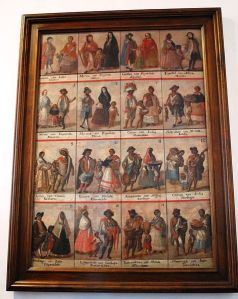Casta paintings have become quite popular in the art and antiques world. Largely created in eighteenth century Mexico by unknown artists and purposed by unknown parties, Casta paintings depicted family scenes, giving us a rare opportunity to glimpse into the private lives of those living in Colonial Spanish America.
These windows into the past are useful as there are very few alternative sources available for this period and place for gaining an idea of private and family spaces. Rebecca Earle examines these paintings from the point of view of race relationships. In particular she is interested in what the paintings are trying to represent – suggesting a unity to conceptions of race and racial identity – in contrast to the reality in which race was viewed as a much more mutable classification. Earle explores this theme noting that physical characteristics were not the only method used to racially classify. Social aspects were often equally important including the types of clothes worn and living standards.

